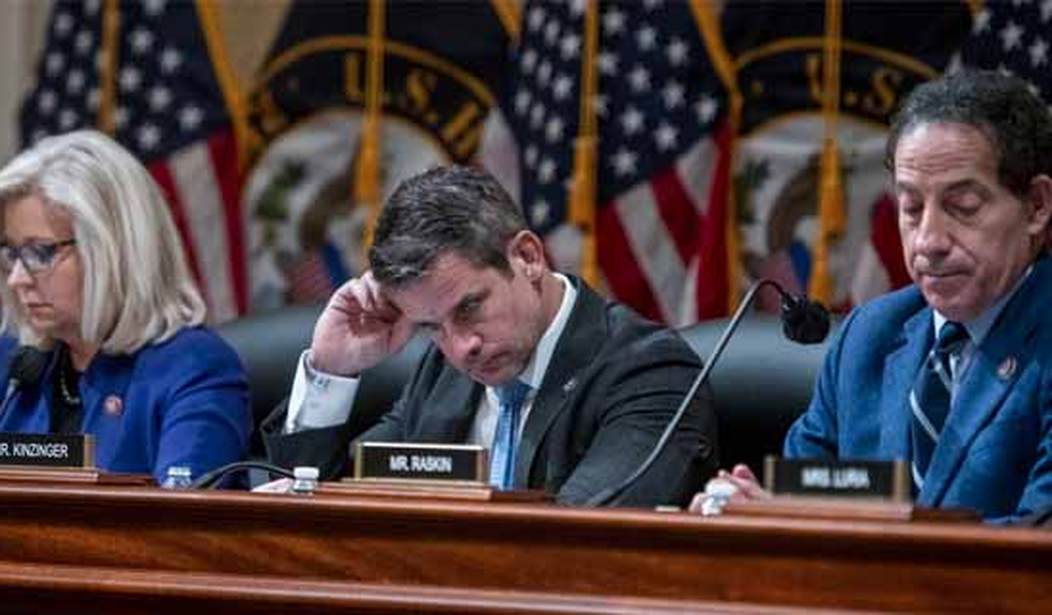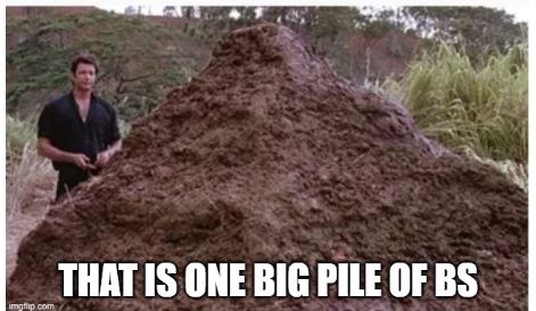All Republicans (and Democrats) should vote against Speaker Mike Johnson's 1,500-page continuing resolution. As our own Amy Curtis reported earlier, Vivek Ramaswamy went through the whole thing and found it contains more pork than a bacon buffet. "The bill could have easily been under 20 pages," said Ramaswamy. It's bad enough that the bill includes a significant pay raise for members of Congress; it also extends the controversial Global Engagement Center, which works to censor conservative news outlets.
One thing people have dug out of the bill for scrutiny is Section 605.
Section 605
— R (@RickKir71728913) December 18, 2024
If it's not trending, it should be.
COVERUP: Make no mistake Section 605 of the Continuing Resolution was designed to prevent @PamBondi and @Kash_Patel from investigating Schiff, Swalwell, and Cheney.https://t.co/QLseznsnBn
— @amuse (@amuse) December 18, 2024
Speaker Johnson's 1,547-page spending monstrosity has a little gift to Pelosi's Partisan J6 Committee.
— Kyle Becker (@kylenabecker) December 18, 2024
Buried way down in section 605 is a passage that would shield House members from independent investigators.
"MOTIONS TO QUASH OR MODIFY—Upon a motion made promptly by a House… pic.twitter.com/3XH92bFT1l
…
"MOTIONS TO QUASH OR MODIFY—Upon a motion made promptly by a House office or provider for a House office, a court of competent jurisdiction shall quash or modify any legal process directed to the provider for a House office if compliance with the legal process would require the disclosure of House data of the House office."
What does this mean in plain English?
If someone (like a House office or a service provider working for a House office) believes a legal request for information (such as a subpoena) would force them to disclose sensitive House data, they can quickly file a motion with a court to stop or change the request.
The court must agree to block or change the request if it would result in the disclosure of the House’s sensitive data.
In essence, this ensures House offices' data remains protected, and provides a way to challenge legal requests for that data.
This could be used to shield J6 committee members accused of deleting records and may be criminally prosecuted under the Trump administration.
Recommended
Here's a very lengthy and detailed breakdown of Section 605 (emphasis added):
Okay, let's break down Section 605 and how far it goes in terms of potentially quashing subpoenas and other legal processes.
— Loxx (@algxtradingx) December 18, 2024
🧵
What Section 605 Does (and Doesn't Do)
Section 605 of the bill, titled "TREATMENT OF ELECTRONIC SERVICES PROVIDED FOR HOUSE OFFICES," establishes… https://t.co/pAuQH9VGLX
What Section 605 Does (and Doesn't Do)
Section 605 of the bill, titled "TREATMENT OF ELECTRONIC SERVICES PROVIDED FOR HOUSE OFFICES," establishes special rules for handling electronic data belonging to offices within the U.S. House of Representatives. It doesn't outright ban all subpoenas, but it creates a significant hurdle for anyone trying to obtain House data through legal means.
Here's a step-by-step explanation:
Defines "House Data" Broadly: It starts by defining "House data" in an extremely broad way. This includes emails, other communications, metadata, and essentially any other information belonging to a House office.
Treats Third-Party Providers as Extensions of House Offices: The section states that even if House data is stored or processed by a third-party provider (like a cloud storage company or email service), the House office is still considered to be in possession of that data. The providers and the Office of the Chief Administrative Officer are not considered to have taken possesion. This is important because it means the House can assert control over data even when it's not directly on their servers.
Allows Notification of Legal Processes: It clarifies that providers can notify a House office if they receive a legal process (like a subpoena) seeking House data.
Mandates Quashing or Modification: This is the most controversial part. It states that if a House office or its provider receives a legal process that would require the disclosure of "House data," and the House office or provider objects, a court must quash (cancel) or modify that legal process. The court doesn't have discretion here; it's a mandatory action. This is triggered upon a motion made promptly, there is no further check.
Preempts Conflicting State Laws: It states that any state or local laws that conflict with this section are invalid (preempted).
Applies Retroactively: The section applies to legal processes filed even before the law is enacted, unless the data has already been disclosed.
How Far Does It Go in Quashing Subpoenas?
It doesn't explicitly say "all subpoenas are invalid." However, it effectively gives House offices a powerful tool to block or significantly delay subpoenas and other legal requests for their data. Here's why:
The House Office Decides What's "House Data": Because the definition of "House data" is so broad, a House office can claim that virtually any requested information falls under this category.
Automatic Quashing: Once a House office makes this claim and objects to the legal process, the court is required to quash or modify it. The court can't independently assess whether the data is truly sensitive or relevant to a legitimate investigation.
Practical Effect: In practice, this means that a House office can likely block a subpoena simply by asserting that the requested information is "House data."
Limits and Potential Challenges:
While the section is very broad, there are some potential limits and avenues for challenge:
"Court of Competent Jurisdiction": The section refers to a "court of competent jurisdiction." This means that the legal process must be issued by a court that has the authority to do so. This could potentially be a point of legal argument.
Constitutional Challenges: This provision is likely to face legal challenges on constitutional grounds. Opponents could argue that it violates the separation of powers, due process, or other constitutional principles. It is difficult to see how this is constitional.
Public and Legal Scrutiny: The sheer breadth of this provision and its potential for abuse are likely to draw intense public and legal scrutiny. This could lead to pressure on Congress to amend or repeal the section.
In Conclusion
Section 605, as written, creates a significant obstacle to obtaining House data through legal processes. While it doesn't explicitly ban all subpoenas, it gives House offices a powerful mechanism to block or delay them, potentially shielding themselves from scrutiny and accountability. The broad definition of "House data," the mandatory quashing provision, and the preemption of state laws combine to create a provision that is ripe for abuse and likely to face legal challenges. This provision would make it incredibly difficult to investigate potential wrongdoing by members of the House or their staff.
Johnson says Congress has to pass the continuing resolution because of the important disaster relief and farm aid it contains. So why is there a section called MOTIONS TO QUASH OR MODIFY? What does that have to do with keeping the government running through spring?
We need to figure out who in Congress injected the section 605 into the CR.
— Loxx (@algxtradingx) December 18, 2024
Once we know who that person is, we can start mapping out a proctor theory based on the idea that the insertion of section 605 into the CR was with the intent to conceal a crime.
Find out who inserted… https://t.co/8OEuibLHmU
@SpeakerJohnson Do not do this!
— Deplorable_Maximus (@CritchlowPaul) December 18, 2024
Does this expire in March? Or is this permanently enacted?
— Lily (@Floridabullshrk) December 18, 2024
In this case, no. Section 605 would be established in law forever until it’s overturned by the Supreme Court.
— Loxx (@algxtradingx) December 18, 2024
This is definitely aimed at protecting themselves from past actions where they could be indicted.
— Kim Ed (@Kimislearning2) December 18, 2024
I'd love to know who added this section
— Wirra (@wirraone) December 18, 2024
Who wrote that motion???
— j6 Raging Pard-on 🇺🇲 (@DidacticaStar) December 18, 2024
It's pretty clear why they wrote it — the question now is who wrote it. Someone with something to hide, it seems.
***
























Join the conversation as a VIP Member